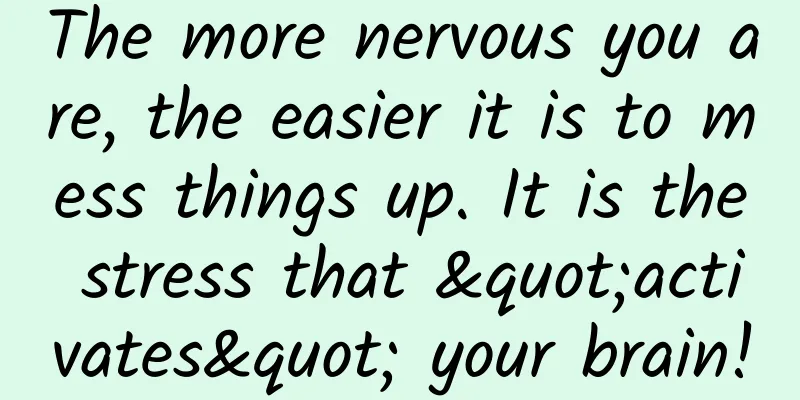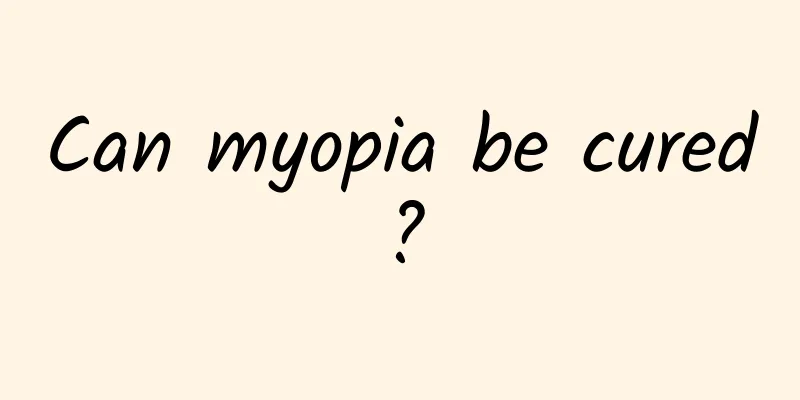The more nervous you are, the easier it is to mess things up. It is the stress that "activates" your brain!

|
Produced by: Science Popularization China Produced by: Chen Yufeng Producer: Computer Network Information Center, Chinese Academy of Sciences Have you had any of these experiences? Before an exam or when the deadline is approaching, you would rather use your phone to check Weibo or TikTok; After a busy week at work, I feel exhausted when the weekend comes and I just want to stay at home. When you are very busy, you may inexplicably like to eat sweets or high-calorie foods, or often feel sore all over your body for no reason... Don’t ignore these symptoms; they may be your body and mind sending you “signals” that you’ve been under too much stress lately. In modern society, long-term stress is one of the causes of many mental health problems, including emotional problems, insomnia, depression, anxiety, etc. Recently, more and more cognitive neuroscience studies have shown that stress is one of the reasons why people are easily "overwhelmed". Long-term exposure to huge stress will cause people's brain function to become disordered, making it difficult for people to control their own thinking and behavior normally, thus leading to a series of mental health problems. But whenever we feel stressed, it is because we urgently need to solve some problems. However, the more stressed we are, the harder it is for our brain to think calmly, and the easier it is to mess things up. So, how exactly does stress affect our brains? Image | Unsplsh The brain often "short-circuits", it may be too much stress Human thinking ability actually comes from the sparks generated by the connection of brain neurons. One of the most important connection centers is the prefrontal cortex. The prefrontal cortex is the "big brother" in the cerebral cortex, managing the individual's various executive functions, including abstract thinking, planning, concentration and attention allocation. The prefrontal cortex controls the individual's thinking, emotions and behavior by sending signals to other brain regions. A study published in the famous journal "Proceedings of the National Academy of Sciences of the United States of America" (PNAS) found that stress can interfere with the function of the prefrontal lobe and cause a "short circuit" in the brain. This study recruited 20 medical students who were facing important exams. They had just experienced 4 weeks of intense review before. The researchers used the Cohen perceived stress scale to test and confirm that they were indeed under great stress. The researchers also compared 20 normal control groups without any stress. Both groups of subjects were required to complete the same attention control task, and their brain activation and functional connectivity states were scanned using functional magnetic resonance imaging technology fMRI. The results of the study found that the greater the stress, the greater the attention-shift cost, and the weaker the functional connection between the prefrontal cortex and other brain regions. In other words, when people are under greater stress, if they want to switch from what they are currently doing to another thing, it will take longer to react, and it will be more difficult for the brain to mobilize cognitive resources to respond quickly, which is what the saying "the brain can't switch all at once" means. This is why we tend to mess things up if we rush for success when we are nervous. In addition, some researchers compared the brain activation and connection states of two groups of subjects under stress and non-stress conditions, and found that the brain's operating modes were very different in the two states. The connectivity between the prefrontal cortex and various brain regions in stress and non-stress states (Source: Arnsten, 2009) In a non-stressful state, signals from the prefrontal lobe can be transmitted to various brain regions, thereby better controlling the individual's thinking, emotions and behavior, allowing people to handle affairs in an orderly manner. When an individual is under stress, the brain connection centered on the amygdala will become stronger, and the function of the prefrontal lobe will be weakened. The amygdala is the emotional center of human beings, so the individual will shift from a "think twice before acting" to an "emotional" behavior pattern. It's like the brain is "short-circuited", losing the ability to think rationally, and tends to treat things in a habitual way, sticking to conventions instead of being flexible. I often make wrong choices, maybe because I am under too much pressure. In our daily lives, we have to make various choices, and some of them will have a significant impact on our lives. Psychologists have found through experimental research that the pressure we face will also seriously affect our rational judgment. Image | Pexels This psychological study was conducted by Wagner and others from the Department of Psychology at Stanford University. Wagner recruited 38 volunteers. The volunteers first learned about a small range of city street scenes through VR real scenes. There were some landmarks on the road to help the volunteers remember the route. In the first two days of the experiment, each volunteer only learned a few familiar paths. Although there was actually a shortcut, the volunteers did not know it at this time. Route map: the route display of the street view where the volunteers are located; Street view: the scene that the volunteers actually see (Image source: Brown, Gagnon & Wagner, 2020) On the third day of the experiment, the volunteers were divided into two groups. Both groups needed to independently reach the end point from the starting point, but they had some time to think and plan the route they wanted to take before setting off. One group was subjected to mild electric shocks from time to time, so this group of volunteers was always worried about being shocked and was under pressure all the time, while the other group of volunteers completed the task in a relaxed state. The results showed that most of the people in the stress group chose to take the familiar route, and only a few people planned shortcuts, while the non-stress group was just the opposite, with most people successfully planning shortcuts. This shows that when people are under intense mental pressure, it is difficult to think carefully and make the best choice. Image source: Brown, Gagnon & Wagner, 2020 Wagner also used fMRI to explore the brain neural signals of volunteers and found that the non-stress group also thought about choosing to take the familiar route, while the stress group did not even think about taking the familiar route. The prefrontal cortex and hippocampus are important brain areas for people to make the best plan based on existing experience, but when people are under intense stress, these two brain areas are in a "silent" state, making it difficult for people to make the best choice. When we need to make important choices, we must pay attention to whether we are under pressure, otherwise it is easy to become short-sighted. Fortunately, psychologists have found that the impact of stress on brain function is short-term and reversible. In the PANS study mentioned above, when the subjects were given the same test and fMRI scan again four weeks later, the subjects whose brain function was originally disturbed by great stress had returned to normal. The prefrontal lobe still played the role of "big brother", allowing the brothers in other brain regions to work normally, and the amygdala would not continue to "run wild". Therefore, as long as we deal with stress in the right way, our brain can still return to normal function. How to deal with stress in life Our lives are full of pressure, but moderate pressure is not necessarily a bad thing. As the saying goes, "pressure is motivation." However, when you are under continuous high-intensity pressure, you need to learn to adjust. Image | Unsplash The National Institutes of Health (NIH) has provided a series of methods for coping with stress: Be good at self-reflection. Always pay attention to whether your mental state is under stress, such as difficulty sleeping, alcohol or substance abuse, irritability, depression or negative energy, etc. Get regular exercise. Even a 30-minute walk every day can improve a person's mood and make them feel less stressed. Try some relaxing activities. Anything that makes you feel relaxed can be done, such as deep breathing, meditation, yoga, social activities, or playing some relaxing games. Set goals and prioritize. Try to sort out the things you are facing, which ones must be completed now and which ones can be postponed, especially when you feel overwhelmed, learn to say no to new things. And at the end of each day, think more about what you have accomplished, rather than what you have not yet done. Communicate more with relatives and friends. We are not alone in society. When we are under pressure, we should communicate more with friends or family who can provide help. Even talking to strangers on the Internet can achieve a good relaxation effect. Seek necessary psychological help. When your stress has had a great impact on your life, but you are unable to relieve it, you must seek necessary psychological help, whether it is going to a psychological counselor or a hospital psychology department. These are not shameful things, but just like a cold or fever, it is a normal move to seek professional help to maintain your physical and mental health. Moderate stress can make us successful, but excessive stress can also destroy us. We cannot control the stress in life, but we can adjust ourselves. References (1) C. Liston, BS McEwen and BJ Casey. (2009). Psychosocial stress reversibly disrupts prefrontal processing and attentional control. Proceedings of the National Academy of Sciences. (2) TI Brown, SA Gagnon and AD Wagner. (2020). Stress disrupts human hippocampal-prefrontal function during prospective spatial navigation and hinders flexible behavior. Current Biology. (3) Amy FT Arnsten. (2009). Stress signaling pathways that impair prefrontal cortex structure and function. nature reviews neuroscience. |
<<: I can't sleep because I'm so anxious about going to work tomorrow.
>>: When is black truffle in season? Can black truffle be refrigerated?
Recommend
There is gray-brown color below when menstruation is not coming
The menstruation of a normal person should be bri...
Pat your face to remove wrinkles
People who don't fall asleep at noon are gett...
Umeng: In 2012, the number of active iOS users in China reached 85 million, and the number of active Android users reached 160 million
In 2012, the rapid development of mobile Internet...
What are the maintenance measures after uterine myoma removal?
Uterine fibroids are a relatively common gynecolo...
Diagnosis and treatment of vascular dementia
Diagnostic criteria for vascular dementia Vascula...
What causes anal pain during pregnancy?
Although there will be various changes in the pre...
Is it necessary for me to do the low-dose CT in the company physical examination since I am not a high-risk group for lung cancer?
On November 19, 2020, the 42nd patient education ...
Why does the vaginal discharge smell like tofu dregs?
Gynecological diseases are a common disease in to...
What should I pay attention to when removing the fallopian tube for ectopic pregnancy?
Ectopic pregnancy is an abnormal pregnancy proces...
Which department should I go to for the first pregnancy checkup?
The first pregnancy should be seen by a gynecolog...
What happens if there are follicles but no ovulation?
Whether or not a woman can ovulate is the key to ...
How long does it take to remove freckles by taking natural vitamin E?
In summer, the season of showing personal charm, ...
What causes pain around the breast?
There is not a single cause for pain around the b...
Will cervical polyps disappear on their own?
For women, the uterus is one of the most importan...
A big lump grows next to my vulva and it hurts
The private part is a very sensitive part of the ...









